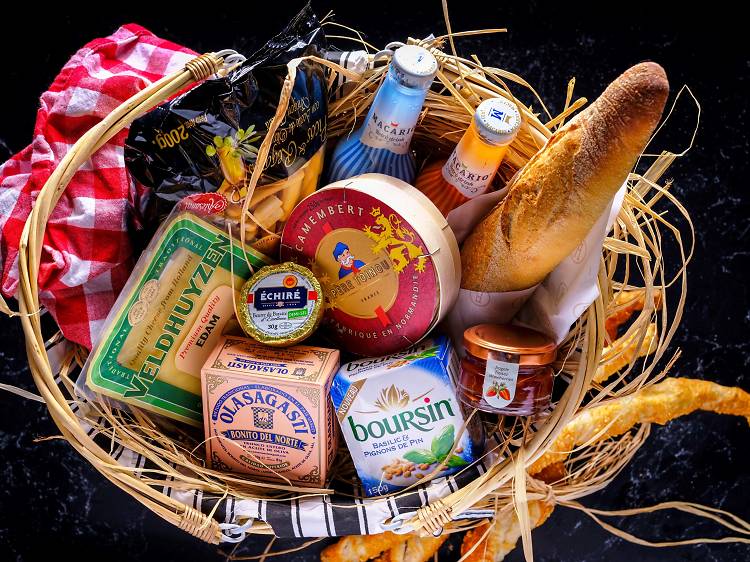If you love cheese, then it’s time to discover the unique and exquisite range of flavors from Israel. From traditional Israeli cheese to artisan creations, the country offers a diverse range of dairy products that are sure to tantalize your taste buds. In this article, we will delve deeper into the world of cheese from Israel, highlighting the distinct characteristics that set it apart in the global cheese market.
Israeli cheese is known for its exceptional quality, thanks to the country’s strict kosher certification standards. This certification ensures that the cheese is produced using the highest quality ingredients and adheres to strict dietary laws, making it an excellent choice for those seeking kosher dairy products.
Whether you’re a connoisseur or just a cheese lover, Israeli cheese is an experience that you don’t want to miss. So, join us as we explore the rich history and unique Mediterranean flavors that make Cheese from Israel truly exceptional.
The Rich History of Cheese in Israel
Cheese has been an essential part of Israeli cuisine since ancient times, dating back thousands of years. The land of Israel lies at the crossroads of Europe, Asia, and Africa, making it an ideal location for the exchange of culinary traditions and ingredients. Middle Eastern and Mediterranean influences have played a significant role in shaping the development of Israeli cheese, giving rise to unique flavors and textures.
The production of cheese in Israel has evolved over the centuries, from traditional small-scale practices to more modern and innovative techniques. In the earlier days, goats and sheep were primarily used for milk production, and the cheese-making process was carried out in small batches by local farmers. Today, Israeli cheese producers have access to a wide range of dairy sources and modern technology, enabling them to create a diverse selection of cheese that reflects both tradition and innovation.
Israeli cheese is known for its distinct and bold flavors, which are a result of the unique ingredients and production methods used to make it. The use of local herbs and spices, as well as the incorporation of techniques from neighboring countries, has resulted in a wide range of Middle Eastern and Mediterranean-style cheeses that are unmatched in taste and quality.
One of the most significant factors that sets Israeli cheese apart from its international counterparts is its kosher certification. This certification ensures that the cheese adheres to strict dietary laws and quality standards, making it an excellent choice for those seeking high-quality kosher dairy products.
In the next article, we will explore the traditional Israeli cheese varieties that have been passed down through generations and the unique flavors and textures that characterize them.
Kosher Certification: A Mark of Quality
In the world of dairy products, kosher certification holds significant importance. Kosher cheese is produced following Jewish dietary laws and is subjected to strict quality control measures. Cheese from Israel bears the kosher certification, ensuring that it is made in compliance with these religious and dietary standards.
| Kosher Cheese Production | Non-Kosher Cheese Production |
|---|---|
| Milk is sourced from cows that have been fed with a specific diet and raised and milked according to strict standards. | Milk may be sourced from cows exposed to antibiotics and growth hormones for increased milk production. |
| Production process is overseen and certified by a rabbi. | Production process is not overseen by religious authorities. |
| Utensils used for production are dedicated solely to kosher production. | The same utensils may be used for both kosher and non-kosher production. |
Kosher cheese production in Israel is subjected to strict regulations set by the Chief Rabbinate of Israel. All cheese produced and sold in the country must bear the kosher certification symbol, representing the highest standards of quality and adherence to religious practices.

Choosing Israeli kosher cheese ensures that consumers are not only purchasing a high-quality product but also engaging with centuries-old religious traditions. Whether you follow a kosher diet or simply appreciate the standards of excellence that kosher certification represents, Israeli cheese is a delicious and culturally rich choice for dairy lovers.
Traditional Israeli Cheese Varieties
Israel has a rich history of cheese production, with traditional Israeli cheese varieties dating back centuries. These classic cheeses have distinct flavors and are deeply rooted in the country’s culinary traditions, reflecting the agricultural diversity of the region.
One popular traditional Israeli cheese is Tzfatit, a semi-hard cheese made of goat or sheep’s milk that has a tangy, slightly salty taste. It is often used in salads or as a topping for pizza or pasta dishes.
Labneh is another widely consumed Israeli cheese, made from yogurt that has been strained to remove the whey. It’s known for its thick, creamy texture and tangy flavor. This cheese is often spread over bread or blended with herbs to create a delicious dip.
Bulgarian cheese is a semi-soft cow’s milk cheese with a smooth and creamy texture. It has a mild, slightly sweet taste that pairs well with fruits and vegetables.
Finally, Cottage cheese is an Israeli staple, produced in many different varieties and is a key ingredient in Israeli cuisine. Its crumbly texture works well with bread or as part of salads.
Traditional Israeli cheese varieties are crafted using artisanal methods, which results in high-quality and delicious cheeses that reflect the country’s culinary heritage.
Artisan Craftsmanship and Innovation
Israeli cheese producers are renowned for their innovative and creative approaches to crafting artisanal cheese. They have embraced the use of locally sourced ingredients and modern production techniques, while maintaining a deep commitment to quality. This dedication to craftsmanship and innovation sets Israeli artisan cheese apart in the global cheese industry.
One prime example is Shamir Salads, a family-owned business that has been producing cheese for over 30 years, using traditional Israeli methods. They have recently introduced new flavors to their range of artisan cheese, such as lemon and garlic and herbs and chili. These bold and exciting flavors have quickly caught on with cheese enthusiasts and connoisseurs, elevating Israeli cheese to new heights.
Another notable Israeli artisan cheese producer is Ein Kamonim Dairy. Situated in the heart of the Carmel Mountains, this dairy produces a range of delicious cheeses such as Crème Gauche and Camembert, with a unique Israeli twist. They use locally grown herbs and spices, giving their cheese a distinct flavor profile.
Going beyond traditional cheese varieties, Israeli cheese makers are also experimenting with vegan cheese alternatives, using innovative ingredient combinations such as nuts, soy, and coconut milk. This reflects the country’s progressive approach to food innovation and catering to diverse dietary needs.
Committed to excellence and quality, Israeli artisan cheese continues to push the boundaries of flavor and invention, cementing its place as a leading producer of unique and delicious cheese, enjoyed by cheese lovers around the world.
Exploring Israel’s Cheese Industry
Israel’s cheese industry has been expanding rapidly, with the country’s unique cheese offerings gaining immense popularity in international markets. The quality and diversity of Israeli cheese have made it a sought-after dairy product worldwide.
According to recent statistics, cheese exports from Israel have increased significantly over the past few years. In 2019, the country exported around 6,500 tons of cheese, recording a growth of 11% compared to the previous year. This growth has had a positive impact on the country’s economy, boosting the cheese industry’s contribution to the agricultural sector.
The Top Destinations for Israeli Cheese Exports
| Country | Percentage of Israeli Cheese Exports |
|---|---|
| United States | 46% |
| France | 15% |
| United Kingdom | 11% |
| Canada | 7% |
| Belgium | 5% |
The United States is the top destination for Israeli cheese exports, accounting for almost half of all exports. France and the United Kingdom are also significant importers of Israeli cheese, highlighting the growing demand for unique and high-quality dairy products globally.
The success of Israeli cheese exports can be attributed to the craftsmanship and innovation of Israeli cheese producers, who have been creating exceptional dairy products for centuries. By combining traditional production techniques with modern technology and local ingredients, Israeli cheese has become a prominent player in the global cheese industry.
Unique Mediterranean Flavors
Israeli cheese offers a unique range of flavors that reflects its Mediterranean culinary roots. From tangy feta to creamy labneh, Israeli cheese boasts a diverse range of tastes that can appeal to any palate. The cheese’s distinct flavor comes from the use of high-quality ingredients, traditional production methods, and a commitment to taste and craftsmanship.
One popular Mediterranean cheese variety from Israel is halloumi. This semi-hard cheese is made from a blend of goat and sheep milk and has a tangy flavor with a salty finish. It is often grilled or pan-fried, making it a popular choice for sandwiches or salads.

Another popular Israeli cheese is tzfatit, which is similar to a Greek feta cheese. Tzfatit is made from sheep’s milk and has a tangy, sharp flavor profile that pairs well with salads and fruits.
Finally, labneh is a tangy, creamy cheese that has become increasingly popular in recent years. Made from strained yogurt, labneh has a smooth texture and a slightly sour taste. It can be enjoyed alone or used as a versatile ingredient in dips, spreads, and sandwiches.
Pairing Israeli Cheese with Culinary Delights
Israeli cheese is renowned for its unique and robust flavors that can be further enhanced by pairing it with complementary ingredients. By pairing the cheese with locally sourced fruits, wines, and bread, the flavors of Israeli cheese can be fully explored and enjoyed.
Fruit Pairings
Fruits can be a great accompaniment to Israeli cheese, enhancing the natural sweet and tangy flavors of the cheese. For instance, a slice of juicy peach or pear can provide a refreshing balance to a sharp and savory Israeli feta cheese. Meanwhile, the mild, creamy texture of Israeli cottage cheese can be complemented by the subtle sweetness of tropical fruits like mango and papaya.
Wine and Cheese Pairings
Wine and cheese pairing is a classic culinary tradition that can be enjoyed with Israeli cheese. The bold and complex flavors of a rich Israeli goat cheese can be wonderfully balanced by a full-bodied red wine, such as Cabernet Sauvignon or Shiraz. Meanwhile, a mild and creamy Israeli labneh cheese can complement a crisp white wine, like a Sauvignon Blanc or Pinot Grigio, creating a refreshing and elegant combination.
Bread Pairings
Bread is a staple food that can be paired with various Israeli cheese types to bring out the unique flavors and textures. For instance, Israeli feta cheese can be spread on a fresh baguette, creating a satisfying crunch and salty tang. On the other hand, the rich and buttery flavor of Israeli soft cheese can be complemented by a toasted slice of sourdough or ciabatta bread.
Embracing Israel’s Cheese Culture
Israel has a deep and longstanding history of dairy production and consumption, and cheese is an integral part of its culinary heritage. From traditional Israeli cheese varieties to artisan creations, dairy products play a significant role in the country’s cuisine.
The cheese industry is one of Israel’s leading agricultural sectors, providing a crucial source of income and employment across the country. Israeli cheese and dairy products are highly regarded for their quality and diverse range of flavors.
Israelis take great pride in their cheese culture, and it is celebrated throughout the year in various food festivals and culinary events. Visitors to Israel can experience the country’s cheese culture firsthand, exploring local markets and sampling a wide variety of delicious dairy products.
Whether it’s enjoying a traditional Israeli breakfast of fresh cheese and bread, or pairing artisanal Israeli cheeses with locally sourced wines and fruits, the country’s cheese culture offers a unique and delicious culinary experience.
As Israel’s cheese industry continues to expand and evolve, the country’s dairy products are becoming increasingly popular in international markets, further cementing Israel’s place as a leading producer of high-quality cheese.
So, whether you’re a cheese lover or simply want to explore Israel’s rich culinary traditions, be sure to sample some of the country’s delicious dairy products and experience the unique flavors and culture of Israeli cheese.
Israeli cheese is known for its distinct flavors and craftsmanship. The combination of Middle Eastern and Mediterranean influences has contributed to the development of unique cheese varieties that reflect the region’s culinary heritage.
Yes, Israeli cheese is kosher certified, adhering to strict dietary laws and quality standards. This certification ensures that the cheese is suitable for those seeking kosher dairy products.
Traditional Israeli cheese varieties include Tzfat cheese, a semi-hard cheese with a tangy flavor, and Labneh, a creamy strained yogurt cheese. These cheeses are deeply rooted in Israeli culinary traditions.
Israeli artisan cheese is produced with a focus on locally sourced ingredients, modern production techniques, and a commitment to quality. Artisan cheese makers in Israel often employ innovative approaches to create unique and flavorful cheeses.
Israeli cheese exports have been steadily growing, contributing to the country’s economy. The increasing popularity of Israeli cheese in international markets demonstrates the global recognition and demand for its unique flavors and craftsmanship.
Israeli cheese offers a range of Mediterranean flavors, including tangy feta, creamy labneh, and flavorful halloumi. These cheeses showcase the diversity and vibrancy of the region’s culinary heritage.
Israeli cheese pairs well with various culinary delights. Try pairing tangy feta with fresh fruits, rich labneh with local bread, or halloumi with grilled vegetables. Experimenting with different combinations can elevate the flavors of Israeli cheese.
Cheese holds an integral place in Israeli cuisine. It is used in traditional dishes such as shakshuka, served alongside fresh salads, and enjoyed as a standalone delicacy. The appreciation and celebration of cheese are deeply embedded in Israeli food culture.



